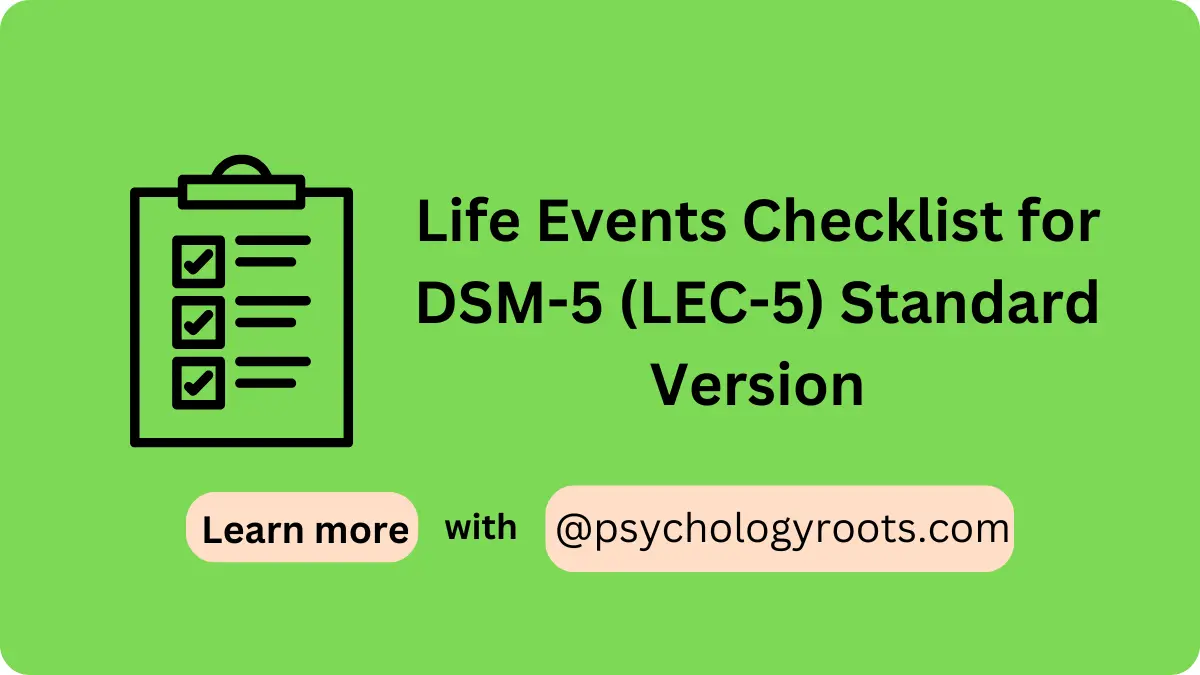Table of Contents
Life Events Checklist for DSM-5 (LEC-5) Standard Version
Here in this post, we are sharing the “Life Events Checklist for DSM-5 (LEC-5) Standard Version”. You can read psychometric and Author information. We have thousands of Scales and questionnaires in our collection (See Scales and Questionnaires). You can demand us any scale and questionnaires related to psychology through our community, and we will provide you with a short time. Keep visiting Psychology Roots.
About Life Events Checklist for DSM-5 (LEC-5) Standard Version
Scale Name
Life Events Checklist for DSM-5 (LEC-5) Standard Version
Author Details
Frank W. Weathers, Ph.D., Daniel D. Blake, Ph.D., Paula P. Schnurr, Ph.D., Danny G. Kaloupek, Ph.D., Brian P. Marx, Ph.D., and Terence M. Keane, Ph.D.
Translation Availability
Not Sure

Background/Description
The Life Events Checklist for DSM-5 (LEC-5) – Standard Version is a self-report screening tool designed to assess exposure to potentially traumatic events that align with DSM-5 trauma criteria. This checklist is widely used in clinical and research contexts to help screen for PTSD-related events or to identify life experiences that may impact mental health. Unlike its Interview Version, the Standard Version is self-administered, providing individuals the flexibility to complete it independently, making it highly accessible for use in various settings.
The LEC-5 Standard Version asks respondents about exposure to a list of 17 potentially traumatic events, such as natural disasters, physical assaults, and life-threatening injuries. Each event can be categorized based on whether it happened directly to the respondent, if they witnessed it, or if it affected someone close to them.
Administration, Scoring and Interpretation
- Suitable for adults and adolescents who may have experienced potentially traumatic events.
- Contains 17 items, each detailing a specific type of event.
- Respondents indicate whether each event has happened to them, was witnessed, affected someone close, or if they are unsure.
Reliability and Validity
The LEC-5 has demonstrated high reliability and is recognized for its utility in accurately identifying trauma exposure across various populations. While it does not diagnose PTSD on its own, it contributes significantly to the comprehensive evaluation of traumatic exposure and potential impact.
Available Versions
Multiple-Items
Reference
Weathers, F. W., Blake, D. D., Schnurr, P. P., Kaloupek, D. G., Marx, B. P., & Keane, T. M. (2013). The Life Events Checklist for DSM-5 (LEC-5) – Standard Version. [Measurement instrument]. Available from https://www.ptsd.va.gov.
Important Link
Scale File:
Frequently Asked Questions
What is the purpose of the Standard Version of the LEC-5?
It helps individuals self-report traumatic experiences relevant to DSM-5 criteria for PTSD.
Who should complete the LEC-5 Standard Version?
It is suitable for anyone needing to screen for trauma exposure, including adults and adolescents.
Does the LEC-5 Standard Version diagnose PTSD?
No, it simply logs exposure to traumatic events; a PTSD diagnosis requires further clinical assessment.
How is it different from the Interview Version?
The Standard Version is self-administered, making it more accessible but less detailed than the interview-based version.
Is professional assistance required to interpret results?
While the form is self-administered, professional input is beneficial to interpret results accurately in a clinical context.
Disclaimer
Please note that Psychology Roots does not have the right to grant permission for the use of any psychological scales or assessments listed on its website. To use any scale or assessment, you must obtain permission directly from the author or translator of the tool. Psychology Roots provides information about various tools and their administration procedures, but it is your responsibility to obtain proper permissions before using any scale or assessment. If you need further information about an author’s contact details, please submit a query to the Psychology Roots team.
Help Us Improve This Article
Have you discovered an inaccuracy? We put out great effort to give accurate and scientifically trustworthy information to our readers. Please notify us if you discover any typographical or grammatical errors.
Make a comment. We acknowledge and appreciate your efforts.
Share With Us
If you have any scale or any material related to psychology kindly share it with us at psychologyroots@gmail.com. We help others on behalf of you.